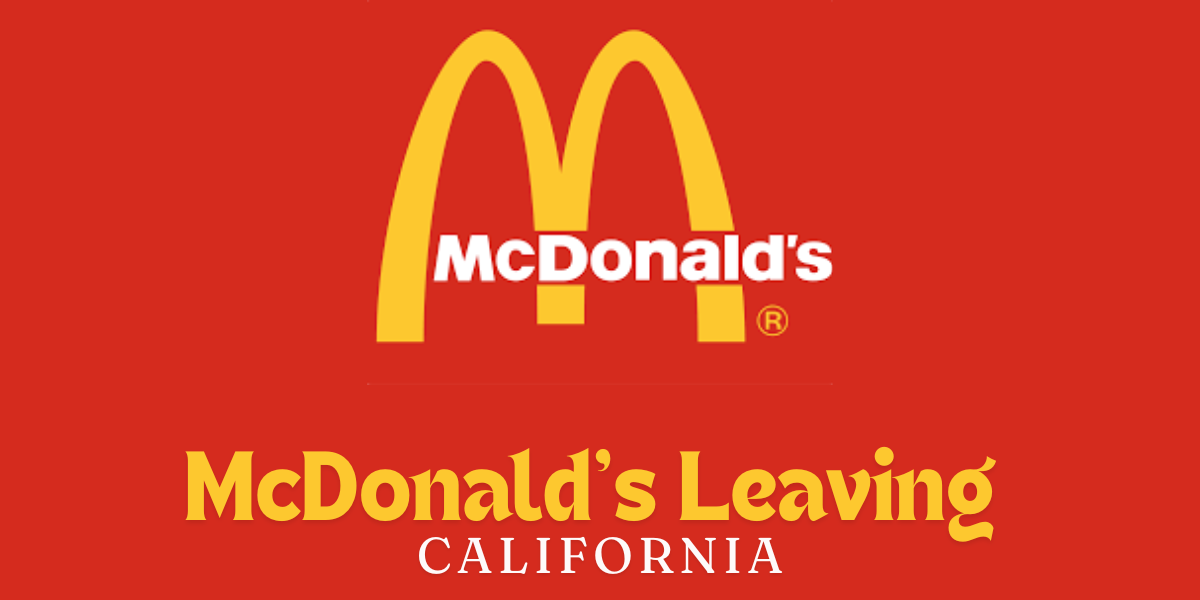McDonald’s, one of the most iconic fast-food chains globally, has been a staple in the American dining landscape for decades. Known for its golden arches and consistent menu offerings, McDonald’s has a significant presence across the United States, including California. Recently, there have been discussions and speculations about McDonald’s potentially leaving California. This article delves into the reasons behind these rumors, the potential impact on the state’s economy, and what this could mean for the fast-food industry.
Background of McDonald’s in California

McDonald’s has a long and storied history in California. The first McDonald’s restaurant opened in San Bernardino, California, in 1940 by brothers Richard and Maurice McDonald. Over the years, McDonald’s has expanded its footprint significantly in the state, becoming a go-to option for fast food lovers.
The Speculations and Rumors
Rumors about McDonald’s leaving California have been circulating due to several factors. These include the state’s stringent labor laws, increasing operational costs, and the overall business climate. California is known for its high minimum wage requirements, which have been a point of contention for many businesses operating within the state.
Labor Laws and Minimum Wage
California has some of the highest minimum wage rates in the country, with plans for further increases in the coming years. While these laws aim to provide a living wage for workers, they also increase the operational costs for businesses. For McDonald’s, which employs thousands of workers across the state, these rising costs could significantly impact their bottom line.
Operational Costs
In addition to labor costs, other operational expenses in California, such as real estate, utilities, and taxes, are higher compared to other states. These expenses contribute to the financial strain on businesses, including fast-food chains like McDonald’s. The cumulative effect of these costs has led to speculation about whether McDonald’s might find it more viable to relocate or reduce its presence in the state.
Potential Impact on the California Economy
If McDonald’s were to leave California, the impact on the state’s economy could be substantial. McDonald’s not only provides employment to thousands but also contributes to the local economy through its supply chain and customer spending.
Job Losses
One of the most immediate effects would be the potential loss of jobs. McDonald’s employs a significant number of individuals in its restaurants, from entry-level positions to management roles. The closure or reduction of McDonald’s locations in California would result in job losses, affecting many families and communities.
Economic Ripple Effect
Beyond direct employment, McDonald’s has a wide-reaching supply chain that includes local suppliers and vendors. The departure of McDonald’s could lead to a ripple effect, impacting businesses that rely on McDonald’s for their livelihood. This could include everything from food suppliers to maintenance services.
Implications for the Fast-Food Industry
McDonald’s leaving California would not only affect the company and the state but could also have broader implications for the fast-food industry. Other fast-food chains might reconsider their operations in California, especially if they face similar challenges.
Shifts in the Market
If McDonald’s were to exit California, it could create a vacuum in the fast-food market. Competitors might see this as an opportunity to expand their presence and capture McDonald’s customer base. This shift could lead to increased competition and changes in the fast-food landscape within the state.
Adapting to New Realities
Fast-food chains, including McDonald’s, might need to adapt to the changing business environment by implementing new strategies. This could include investing in technology to streamline operations, adjusting menu prices, or exploring new business models to offset rising costs.
Conclusion
The speculation about McDonald’s potentially leaving California highlights the challenges businesses face in high-cost states. While no official announcement has been made, the factors driving these rumors are indicative of broader issues within the business environment. The potential impact on California’s economy, job market, and the fast-food industry underscores the need for businesses to continually adapt and innovate in response to evolving economic conditions.
FAQs
1. Why are there rumors about McDonald’s leaving California?
The rumors stem from the state’s stringent labor laws, increasing operational costs, and overall business climate, which make it challenging for businesses like McDonald’s to operate profitably.
2. How do California’s labor laws affect McDonald’s?
California’s high minimum wage requirements and other labor laws increase operational costs for businesses, impacting their profitability and sustainability.
3. What could be the impact of McDonald’s leaving California?
The potential impact includes job losses, economic ripple effects on local suppliers and vendors, and shifts in the fast-food market dynamics.
4. How many people does McDonald’s employ in California?
McDonald’s employs thousands of individuals across the state in various roles, from entry-level positions to management.
5. Could other fast-food chains follow McDonald’s lead?
If McDonald’s were to leave California, other fast-food chains facing similar challenges might also reconsider their operations in the state.
6. How might the fast-food industry adapt to these challenges?
The industry might adapt by investing in technology, adjusting menu prices, or exploring new business models to offset rising operational costs.
7. Has McDonald’s made an official announcement about leaving California?
As of now, there has been no official announcement from McDonald’s regarding plans to leave California.
8. What are the broader implications for the business environment in California?
The situation highlights the challenges of operating in high-cost states and underscores the need for businesses to adapt and innovate in response to evolving economic conditions.
Read More Our Blogs

